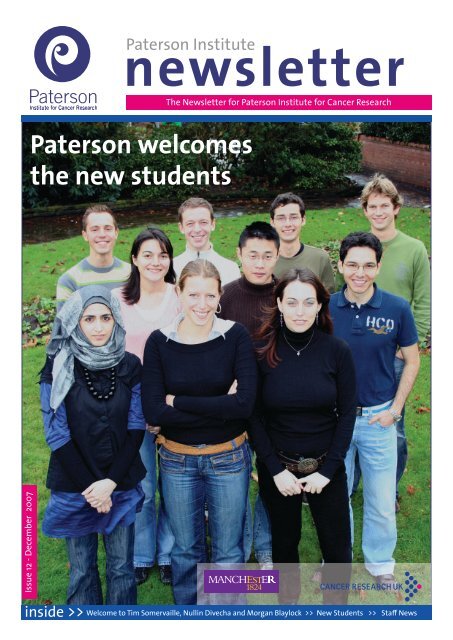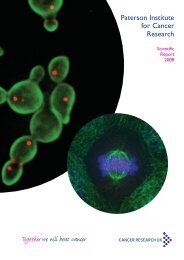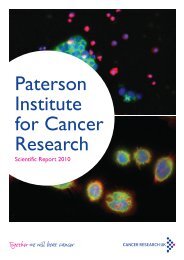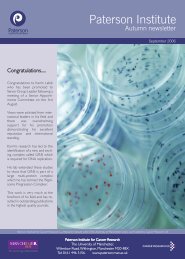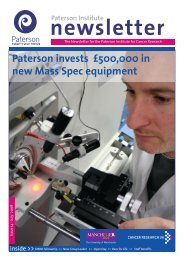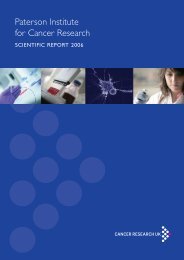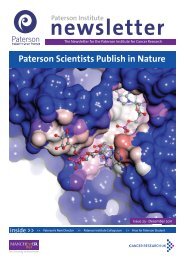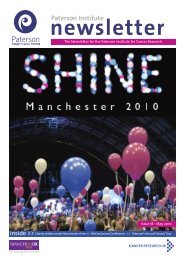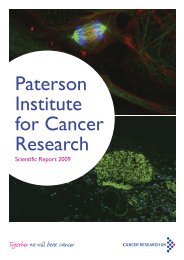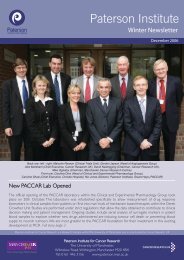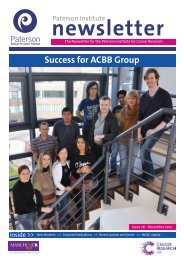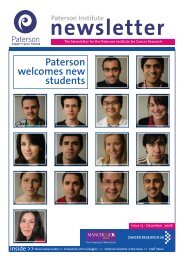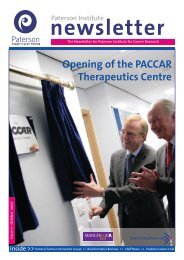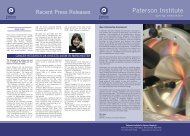Winter 2007 - The Paterson Institute for Cancer Research - The ...
Winter 2007 - The Paterson Institute for Cancer Research - The ...
Winter 2007 - The Paterson Institute for Cancer Research - The ...
Create successful ePaper yourself
Turn your PDF publications into a flip-book with our unique Google optimized e-Paper software.
<strong>Paterson</strong> <strong>Institute</strong><br />
newsletter<br />
<strong>The</strong> Newsletter <strong>for</strong> <strong>Paterson</strong> <strong>Institute</strong> <strong>for</strong> <strong>Cancer</strong> <strong>Research</strong><br />
<strong>Paterson</strong> welcomes<br />
the new students<br />
Issue 12 - December <strong>2007</strong><br />
inside >> Welcome to Tim Somervaille, Nullin Divecha and Morgan Blaylock >> New Students >> Staff News
2<br />
<strong>Paterson</strong> News - <strong>Winter</strong> <strong>2007</strong><br />
Director’s Introduction<br />
We are coming to the end of another very busy year <strong>for</strong> the <strong>Institute</strong>, one that has<br />
seen significant new recruitment of Group Leaders and further investment in our<br />
research services. Since the last Newsletter, two Group Leaders namely Tim<br />
Somervaille and Nullin Divecha have arrived and are busy setting up their research<br />
groups. You will find more in<strong>for</strong>mation on Tim’s group in a featured article in this<br />
issue and Nullin’s group in the Spring Newsletter. Both will strengthen our<br />
research portfolio considerably and help to maintain the momentum of the<br />
<strong>Institute</strong> in building its international presence and recognition. Further<br />
recruitment is underway and we will be interviewing potential candidates in the<br />
New Year.<br />
Refurbishment of accommodation <strong>for</strong> a number of our research service units will take place<br />
over the next couple of months, hopefully with as little disruption to the excellent services<br />
they provide as possible. This is necessary to facilitate expansion of the services such as a<br />
state-of-the-art mass spectrometer which will be arriving shortly. <strong>The</strong>se developments<br />
reflect our commitment to ensure that our services remain at the cutting edge supporting<br />
our research ef<strong>for</strong>ts. This commitment very much depends on the leadership of our service<br />
units as well as the technology and there<strong>for</strong>e we are happy to welcome Morgan Blaylock<br />
who will head the Flow Cytometry facility – you can read all about Morgan in this issue.<br />
Finally I would just like to take the opportunity to wish everyone a Happy Christmas and a<br />
great New Year and to thank you all <strong>for</strong> all your hard work and ef<strong>for</strong>ts <strong>for</strong> the <strong>Institute</strong> over<br />
the last year.<br />
Nic Jones<br />
Director<br />
<strong>Paterson</strong> <strong>Institute</strong> <strong>for</strong><br />
<strong>Cancer</strong> <strong>Research</strong><br />
<strong>The</strong> University of Manchester<br />
Wilmslow Road<br />
Manchester<br />
M20 4BX<br />
t: 0161 446 3156<br />
Inside:<br />
Fundraisers visit institute<br />
Page 3<br />
Leukaemia Biology Group<br />
Page 4<br />
New Students Page 6/7<br />
Aspire Course Page 8<br />
HR Update Page 9<br />
Staff News Page 11<br />
<strong>The</strong> Biotechnology YES<br />
(Young Entrepreneurs<br />
Scheme) Page 12<br />
www.paterson.man.ac.uk<br />
<strong>The</strong> University of Manchester<br />
Royal Charter Number: RC000797<br />
Welcome to new Staff<br />
Page 5<br />
<strong>Paterson</strong> Spotlight<br />
Page1 0
<strong>Paterson</strong> News - <strong>Winter</strong> <strong>2007</strong> 3<br />
Top Fundraisers visit the <strong>Institute</strong><br />
by James Dunphy<br />
Susan Valentine and her niece Alice Benn took part in<br />
Race <strong>for</strong> Life at Heaton Park in June of this year and<br />
between them raised a fantastic £1000 <strong>for</strong> <strong>Cancer</strong><br />
<strong>Research</strong> UK.<br />
<strong>The</strong>y decided to take part following their family’s<br />
experience with cancer. In 1992 Susan’s eldest sister Anita<br />
Clark died from ovarian cancer aged 48. In 2006, Susan’s<br />
other two sisters, Georgina Hart and Lorraine Benn<br />
(Alice’s mum) were also both diagnosed with ovarian<br />
cancer. Georgina is currently undergoing chemotherapy<br />
and Lorraine completed her treatment in May <strong>2007</strong> and is<br />
making a good recovery.<br />
As the top individual fundraisers of the event they were<br />
invited along with Lorraine to spend the morning at the<br />
<strong>Institute</strong>. As well as receiving a personal thank you from Professor Nic Jones they were given a tour of the research facilities. <strong>The</strong><br />
family thoroughly enjoyed their visit to see where the money is being spent and the challenges faced in research.<br />
Following the visit they stated it was inspiring to see where the money goes and they vowed to raise even more money <strong>for</strong> <strong>Cancer</strong><br />
<strong>Research</strong> UK at their next Race <strong>for</strong> Life event in 2008.<br />
Thanks to Nic, Steve Bagley and Helen Ferns <strong>for</strong> their support of this successful event.<br />
Forthcoming CR-UK activities<br />
by James Dunphy<br />
Christmas is an extremely busy time <strong>for</strong> the <strong>Cancer</strong> <strong>Research</strong> UK retail shops. In 2006/07 they raised £64 million. Our shops rely<br />
almost entirely on the generosity of their local communities, as customers and volunteers, but also as donors of good quality<br />
saleable stock. If you would like to donate your time as a volunteer or donate some stock please see James from Project Local.<br />
January is a particularly significant month <strong>for</strong> the Charity with the launch of two of it’s most important income generating events;<br />
Race <strong>for</strong> Life and Relay <strong>for</strong> Life.<br />
Race <strong>for</strong> Life is a 5km women only walk, jog or run which takes places at over 250 venues across the UK (including 40 in the<br />
northwest). So far, over two million women of all ages have run, walked or jogged to raise over £140 million in sponsorship <strong>for</strong> the<br />
charity. This year they hope to raise £60 million <strong>for</strong> <strong>Cancer</strong> <strong>Research</strong> UK by bringing an amazing 800,000 women together.<br />
Relay For Life is an inspirational community event designed to celebrate the lives of people touched by cancer and raise money <strong>for</strong><br />
the vital work of <strong>Cancer</strong> <strong>Research</strong> UK. Teams of people gather at race tracks, parks or sports fields and take turns walking or running<br />
laps. Each team tries to keep at least one member on the track at all times, whilst all around them a party is in full swing, including<br />
stalls, live music, quizzes and dancing.<br />
For more in<strong>for</strong>mation about these events visit:<br />
www.race<strong>for</strong>life.org www.cancerresearchuk.org/relay/
4<br />
<strong>Paterson</strong> News - <strong>Winter</strong> <strong>2007</strong><br />
<strong>Paterson</strong> welcomes the Leukaemia Biology Group<br />
by Tim Somervaille<br />
“Consequently, there is a<br />
considerable need <strong>for</strong><br />
better understanding of<br />
the basic biology of the<br />
disease, which will in<br />
turn enhance the<br />
prospect of improved<br />
treatments <strong>for</strong> patients.”<br />
Approximately 3-5000 people develop<br />
acute leukaemia each year in the<br />
United Kingdom. In recent years there<br />
have been some important advances<br />
in treatment of the disease, most<br />
notably in children with acute<br />
lymphoblastic leukaemia where over<br />
80% are cured. However in adults the<br />
average five year survival is only 20-<br />
25%, rising to around 45% in those<br />
under the age of 50. Consequently,<br />
there is a considerable need <strong>for</strong> better<br />
understanding of the basic biology of<br />
the disease, which will in turn<br />
enhance the prospect of improved<br />
treatments <strong>for</strong> patients.<br />
I have recently moved to the <strong>Paterson</strong><br />
<strong>Institute</strong> and Christie Hospital to start<br />
my own research group in Leukaemia<br />
Biology. One of the areas I plan to<br />
focus my work on is the biology of the<br />
leukaemia stem cell (LSC). Pioneering<br />
work by John Dick and others in the<br />
1990s showed that only a subset of<br />
cells within a malignant leukaemia<br />
clone has the ability to initiate, sustain<br />
and expand the disease (see Figure).<br />
<strong>The</strong>se so-called LSCs are the critical<br />
cellular component of the disease and<br />
they must be completely eliminated in<br />
order to cure the patient. Failure to<br />
achieve this results in disease relapse<br />
and treatment failure. Despite this<br />
discovery being reported some ten<br />
years ago, there is still much more to<br />
be learned about the mechanisms<br />
that regulate the aberrant selfrenewal,<br />
proliferation and<br />
differentiation properties of LSCs in<br />
haematological malignancies.<br />
My career to date has alternated<br />
between the clinic and science. I<br />
trained as a clinical Haematologist at<br />
University College London, taking<br />
three years out along the way to<br />
complete a PhD with Asim Khwaja and<br />
David Linch, studying signal<br />
transduction mechanisms in normal<br />
human haematopoiesis. I then moved<br />
to Mike Cleary’s Lab at Stan<strong>for</strong>d<br />
University in the United States as a<br />
post-doctoral fellow, where I<br />
developed a mouse model of human<br />
leukaemia initiated by an oncogenic<br />
fusion protein called MLL-AF9. This<br />
fusion occurs in about 7% of human<br />
acute myeloid leukaemias and the<br />
model has enabled the study of LSC<br />
biology in a genetically homogeneous<br />
tractable system <strong>for</strong> the first time.<br />
Although I have been told that there<br />
are not that many people who have<br />
voluntarily relocated from Cali<strong>for</strong>nia to<br />
Manchester (!), I am very happy to be<br />
back home in England, where people<br />
seem to understand my sense of<br />
humour, even though the weather<br />
here is perhaps not quite as good as I<br />
have become used to. I am now very<br />
much looking <strong>for</strong>ward to developing<br />
some of the ideas I have in partnership<br />
with my new scientific and clinical<br />
colleagues.
<strong>Paterson</strong> News - <strong>Winter</strong> <strong>2007</strong> 5<br />
<strong>Paterson</strong> welcomes the Inositide Laboratory<br />
Nullin Divecha and his laboratory<br />
joined the <strong>Institute</strong> from NKI,<br />
Amsterdam.<br />
A full feature on the new group will be<br />
in the next edition of the newsletter.<br />
<strong>The</strong> aim of the laboratory is to<br />
understand how phosphoinositides<br />
are modulated and used as second<br />
messengers in different subcellular<br />
compartments.<br />
<strong>Paterson</strong> welcomes Morgan Blaylock - Head of Flow Cytometry<br />
by Morgan Blaylock<br />
Flow cytometry is a relatively simple<br />
technology that simultaneously<br />
measures and then analyses multiple<br />
physical characteristics of cells, as they<br />
flow in a fluid stream through a beam<br />
of light. <strong>The</strong> properties measured<br />
include a particle’s relative size,<br />
relative granularity or internal<br />
complexity, and relative fluorescence<br />
intensity. However, in practice there is<br />
a whole heap that can go wrong.<br />
<strong>The</strong> <strong>Paterson</strong> <strong>Institute</strong> has a long and<br />
distinguished past in flow cytometry.<br />
<strong>The</strong> first cytometer in the building was<br />
a home made one (made by Dr John<br />
Keene and Brian Hodgson) circa 1977.<br />
This was used to measure fluorescent<br />
polarisation as part of an early<br />
detection test <strong>for</strong> <strong>Cancer</strong>. Since then<br />
we have seen a number of<br />
instruments come and go.<br />
My career to date: Originally from<br />
Newcastle I spent my undergraduate<br />
days in London working <strong>for</strong> a while as<br />
a student at the Kennedy <strong>Institute</strong> of<br />
Rheumatology were I managed to get<br />
my hands on my first cytometer. I then<br />
moved to Aberdeen, taking up a PhD<br />
where I worked alongside Professor<br />
Nigel Webster and Dr. Helen Galley<br />
studying the role of endothelial cells<br />
and neutrophils in sepsis. During<br />
which time I became extremely<br />
familiar with flow cytometry,<br />
specifically its application to the field<br />
of apoptosis research. Following this, I<br />
spent the next few years working as a<br />
trainee PI in the field of asthma and<br />
allergy under the tutelage of Dr. Garry<br />
Walsh studying eosinophil apoptosis<br />
and steroid resistance. At this time I<br />
was approached to head up the new<br />
cytometry facility in the University of<br />
Aberdeen. We had recently bought a<br />
FACSDiVa and LSRI and they were<br />
looking <strong>for</strong> someone to take on the<br />
responsibility of the facility and drive it<br />
<strong>for</strong>ward, while becoming the local<br />
‘guru’ in all things FACS related.<br />
I have been at the <strong>Paterson</strong> <strong>for</strong> a little<br />
over a month and I hope to make an<br />
impression on the research and<br />
direction the facility is heading (not to<br />
mention a quite large impression on<br />
Jenny’s budget). My door is open to all<br />
and I look <strong>for</strong>ward to meeting you and<br />
discussing your Cytometric needs.<br />
All the best<br />
Mogs
6<br />
<strong>Paterson</strong> News - <strong>Winter</strong> <strong>2007</strong><br />
New Students<br />
Mariam Al-Mufta<br />
Hi, I'm Mariam. I just started my 3 year PhD as a joint student with the Medical Oncology and Immunology<br />
groups and will be working on 'targeted cellular therapy versus 5T4 oncofoetal antigen'. I'm originally from<br />
the beautiful land of Qatar, finished my undergraduate degree in Wales and my MRes at Manchester<br />
University. My passions are painting and drawing, travelling and eating (especially Arabic food!).<br />
Guilherme Costa<br />
My name is Guilherme (I know it isn’t easy to pronounce) and I’m from Portugal. I started a 3 year PhD last<br />
September in the Stem Cell Biology <strong>Research</strong> group and so far, so good. Regarding Manchester, I find it a cool<br />
and lively city. I’ve already enjoyed a couple of evenings out at Matt & Phreds and at the Corner House, but I<br />
guess there’s a lot more to discover. That's all folks!<br />
Asli Devrekanli<br />
Hello, I am Asli and I am from Turkey. I studied Molecular Biology and Genetics (BS) and I started my PhD in<br />
the Cell Cycle Lab working on cytokinesis. I am very happy to be at the <strong>Paterson</strong> as everyone is kind and<br />
friendly which makes me feel ‘at home’. I believe I will have great time here.<br />
Monique Melis<br />
Hi, I am Monique Melis from the Netherlands. I only moved here mid-July and started as a PhD student in Tim<br />
Illidge’s Targeted <strong>The</strong>rapy Group in August. Besides work, I play hockey at Didsbury and am busy discovering<br />
Manchester!!<br />
Erik Marcelo Alcantar Orozco<br />
Hello, I just started a 3-year PhD in the Medical Oncology group. I am originally from sunny Mexico where I<br />
studied Medicine. I arrived here in September 2006 sponsored by my Government to do an MRes degree in<br />
Life Sciences and a PhD. I am now working with Dave Gilham as my supervisor, and my project is focused on<br />
tumour infiltrating lymphocytes <strong>for</strong> melanoma immunotherapy.<br />
Olga Tsoulaki<br />
I am Olga Tsoulaki from Greece. I did my medical degree in <strong>The</strong>ssaloniki, an MSc course at the University of<br />
Leicester last year and I am now working in the Stem Cell Biology group here at the <strong>Paterson</strong>. So far I am<br />
enjoying every moment of my PhD here in Manchester inside and outside the lab and hopefully it will go on<br />
like this until the very end.. Three more years to go…
<strong>Paterson</strong> News - <strong>Winter</strong> <strong>2007</strong> 7<br />
New Students<br />
Jacek Walczynski<br />
Hi, my name is Jacek. I’ve just started a 4-year PhD in Nic Jones’ Cell Regulation Lab. My research project will<br />
focus on investigating the role of stress-induced transcription factor ATF-2 in the progression and<br />
development of tumours, especially B cell lymphomas. I finished my Master’s Degree at the Jagiellonian<br />
University in Krakow - a truly beautiful and historically interesting city in the South of Poland. I hope to enjoy<br />
and make the most of living in Manchester, as it has a lot to offer <strong>for</strong> someone like me (e.g. the vibrant<br />
nightlife!).<br />
Lu Zhang<br />
I am from China and working in the Cell Regulation Group. I did my undergraduate degree in Manchester as<br />
well, and quite enjoy the life here. Outside science, I like sports a lot, such as basketball, football and<br />
badminton which are my favourites.<br />
Andrzej Rutkowski<br />
My name is Andrzej Rutkowski and I come from Poland, where I studied <strong>for</strong> 5 years altogether at the<br />
Jagiellonian University. I spent a year in Germany as an Erasmus student. I started a PhD at Jagiellonian<br />
University, but after a year, <strong>for</strong> many reasons, I decided to quit and find a new one. This led me to Peter Stern’s<br />
Immunology Group at the <strong>Paterson</strong> <strong>Institute</strong>. I will be officially registered as a PhD student in January 2008,<br />
when I will start a project supervised by both Peter and Crispin. Apart from science, my biggest passion is<br />
music, although I don't play any instrument. I grew up listening to classical music, Beethoven and<br />
Mendelssohn being my favourite composers. A few years ago I fell in love with the music of Tori Amos and she<br />
is without doubt my biggest idol.<br />
Willem-Jan Keune<br />
Hi, my name is Willem-Jan Keune. I just moved from Holland to join the rest of Nullin Divecha's Inositide<br />
group. I started my PhD at the Netherlands <strong>Cancer</strong> <strong>Institute</strong> in Amsterdam and I will continue my project on<br />
PIPkinases in my 3rd year at the <strong>Paterson</strong>. If you fancy Dutch stroopwafels, you are more than welcome to visit<br />
us on the 2nd floor!<br />
Clair Thomas<br />
I have recently started a PhD in the Genito Urinary <strong>Cancer</strong> <strong>Research</strong> group in the KK, under the supervision of<br />
Mick Brown. I lived in Manchester <strong>for</strong> four years, during which time I obtained a first class degree in biology<br />
and an MRes in biological sciences. I have recently moved back home to Sandbach, Cheshire, where I am<br />
enjoying the low cost of living, as well as my Mum's cooking!<br />
Not pictured:<br />
Ciara O'Brien<br />
Always difficult to write about yourself! Currently working in<br />
the Breast Biology group, I am a Medical Oncology Registrar on<br />
the North West rotation. Originally from London, I have now<br />
become a converted Northerner after living and working in<br />
Manchester <strong>for</strong> the past couple of years.<br />
Gireesh Kumaran<br />
Hi I'm Gireesh, I'm working with Caroline Dive and Gordon<br />
Jayson in CEP where I am killing tumour cells with GSAO. I used<br />
to work at the Christie as a medic and I will be going back there<br />
when my project is finished. I like to go running, cycling etc, but<br />
I don't! Instead it is a case of walking to the pub and drinking<br />
Belgian beer!!
8<br />
<strong>Paterson</strong> News - <strong>Winter</strong> <strong>2007</strong><br />
Should we all ASPIRE to better management?<br />
by Stuart Pepper<br />
When you think of management training courses there<br />
are certain clichés that spring to mind such as artificial<br />
(and ever so slightly embarrassing) role-playing<br />
situations or team-building activities like paintballing.<br />
<strong>The</strong> Aspire development programme operates in a<br />
rather different way with the focus being on individuals<br />
setting their own learning goals and then practicing<br />
them whilst engaged on real tasks.<br />
<strong>The</strong> start point <strong>for</strong> Aspire is <strong>for</strong> each participant to collect verbal<br />
feedback from coworkers on their communication style and<br />
ability. Sitting down face to face with people and asking <strong>for</strong><br />
honest feedback is not something that we are used to doing at<br />
work and the prospect of doing this is slightly daunting. In<br />
practice these sessions can be very interesting, sometimes<br />
revealing a gap between your perception of workplace<br />
communications and the perception of those around you.<br />
Collecting feedback brings awareness of these issues, from<br />
there on the aim of Aspire is to help participants develop better<br />
communication tools.<br />
<strong>The</strong> next step in the Aspire program is a two day residential<br />
meeting referred to as ‘workout’. During this time each person<br />
picks some specific learning goals to work on, <strong>for</strong> example one<br />
of mine was to practice phrasing questions in a way that does<br />
not lead towards a certain answer. Participants are then split<br />
into groups and given a task to per<strong>for</strong>m; our group was<br />
considering ways in which the development of management<br />
potential throughout CR-UK could be enhanced. One of my<br />
particular tasks was to try and bring greater awareness of<br />
courses like Aspire to scientists and managers who may not be<br />
aware of them, so everyone who has read this far has helped<br />
me achieve my goal – thank you!!<br />
<strong>The</strong> workout session is an important aspect of the Aspire<br />
program, however it is not the end. Aspire offers a range of<br />
activities to follow up and help participants develop their<br />
management abilities. It is easy to be cynical about<br />
management training courses, however I would say that what<br />
this program does achieve is to enhance participants awareness<br />
of the choices they can make in communication, and how this<br />
affects those around them.<br />
<strong>The</strong> are numerous Learning and Development courses available;<br />
these are aimed primarily at <strong>Cancer</strong> <strong>Research</strong> UK employees;<br />
however staff funded by <strong>Cancer</strong> <strong>Research</strong> UK but employed by<br />
third parties may still be eligible to attend. Anyone interested in<br />
these courses should in the first instance speak to their<br />
manager and then contact Sarah Burns at <strong>Cancer</strong> <strong>Research</strong> UK<br />
<strong>for</strong> further in<strong>for</strong>mation.<br />
Student Social<br />
by Katalin Boros & Dorota Feret<br />
<strong>The</strong> “student social” has become one of the highlights of the<br />
student year (surpassed only, of course, by the excitement of<br />
1st and 2nd year talks, reports and<br />
pre-vivas…) and so we couldn’t let<br />
<strong>2007</strong> end without a night out<br />
together! Apart from being a break<br />
from literature-review writing and<br />
everyday lab work, this was also an<br />
opportunity <strong>for</strong> some of the most<br />
recent students to meet everyone<br />
else. Twenty-six of us headed to the<br />
Parrs Wood Centre <strong>for</strong> a game of<br />
bowling, followed by a round of pool,<br />
while those feeling especially energetic entertained the rest<br />
with an attempt on the dance machine!<br />
Dinner was in nearby East Didsbury, and<br />
the Turkish meal proved very tasty -<br />
though most of us probably wouldn’t be<br />
able to recite the original names of the<br />
dishes. Thankfully, the staff was very<br />
helpful in sorting out our requests,<br />
even with those made on the spot! We<br />
hope everyone enjoyed the night. See<br />
you at next year’s event!
<strong>Paterson</strong> News - <strong>Winter</strong> <strong>2007</strong> 9<br />
HR Update - <strong>Winter</strong>time stress, struggles and the EAP<br />
by Anna Haylock<br />
Everyone thinks of Christmas as the most stressful time<br />
of the year but according to several Employee Assistance<br />
Programme (EAP) Providers, more people call <strong>for</strong> help in<br />
January than most other months.<br />
Dr. Cliff Arnall, a psychologist, devised a <strong>for</strong>mula that<br />
calculates misery and found that in the UK, 24th January<br />
is the most depressing day of the year. He proposes that<br />
it’s a combination of seven variables: weather, debt,<br />
monthly salary, time since Christmas, time since failed<br />
quit attempt (as in an attempt to quit smoking, drinking,<br />
eating poorly), low motivational levels and the need to<br />
take action. He states that the stress and struggle of all<br />
these variables culminate in the middle of January.<br />
And how does that relate to the EAP? Depression and<br />
financial worries are two of the most common reasons<br />
employees call.<br />
A recent research project across the UK examined EAP<br />
access patterns <strong>for</strong> the month of January <strong>2007</strong> of 138,933<br />
employees in 806 organisations. <strong>The</strong> key findings of the<br />
report show that:<br />
• <strong>The</strong>re are 15% more EAP contacts in January compared<br />
to the rest of the year (51% more than December<br />
alone).<br />
As an employer, we have a duty of care to our staff. All<br />
these personal concerns are influencing the ability of<br />
employees to do work and this affects co-workers and the<br />
organisation as a whole. We want to provide our staff<br />
with the very best help and support we can. This is why<br />
we are so proud of the EAP. Run by PPC, the EAP is<br />
available any time day or night, on any day of the year and<br />
can be used by you or anyone in your household. We can<br />
all benefit from the right help and advice at some time in<br />
our lives. <strong>The</strong> EAP provides free and confidential services<br />
on the following topics:<br />
• General in<strong>for</strong>mation and Citizens’ Advice services<br />
(anything from consumer issues to residency advice)<br />
• Financial advice<br />
• Legal advice<br />
• Child and dependant care in<strong>for</strong>mation<br />
• Counselling, both on the telephone and face-to-face<br />
<strong>The</strong>y aim to answer your query there and then or link you<br />
with the right adviser <strong>for</strong> more specialist advice. <strong>The</strong>y will<br />
give you the opportunity to meet one of their fully<br />
qualified counsellors near to your home or to the<br />
<strong>Institute</strong>. <strong>The</strong>re is no limit to the amount of times you<br />
can access the service.<br />
• January is associated with more issues regarding<br />
marriage and relationships (10% to 42% more), and<br />
family (14% to 37% more).<br />
• Reports of mental health problems also rise in January,<br />
including anger (12% more) and depression (7% more).<br />
You can contact them on 0800 282193 or you can visit<br />
this link <strong>for</strong> more in<strong>for</strong>mation<br />
http://intranet.christie.nhs.uk/departments/hr/ppc/inde<br />
x.htm<br />
• Reports of physical health problems such as medical<br />
stressors (13% more) and weight management (10%<br />
more) rise in January.<br />
• Other January increases were found <strong>for</strong> reports of debt<br />
and credit (39% more), career (28% more), and life<br />
transition issues (15% more)<br />
Just a reminder that the Staff Christmas Party will take<br />
place at 4:00pm on Friday, 21st December in the HLT.<br />
Refreshments will be served and there will be the<br />
usual Christmas Quiz, so get your thinking caps on!<br />
ALL WELCOME!
10<br />
<strong>Paterson</strong> News - <strong>Winter</strong> <strong>2007</strong><br />
In the Spotlight<br />
In each issue of the<br />
newsletter we feature<br />
a member of staff<br />
who will take the<br />
‘Spotlight’ and<br />
answer a list of<br />
questions that we<br />
have put together.<br />
<strong>The</strong> next lucky<br />
individual to be<br />
featured is Tom<br />
Southgate, a PostDoc<br />
in the Immunology<br />
group.<br />
What is your favourite part of the UK?<br />
56°34.95N; 05°59.15W, 30 metres down. Sounds strange but it’s<br />
the coordinates of <strong>The</strong> Hispania a 1300 tonne Swedish steamer<br />
which sunk in the Sound of Mull in 1954, that is often listed as<br />
one of the best wrecks in the world to dive. You get fantastic<br />
visibility in the strong currents that pass over it and it teems<br />
with sea life including soft corals, fishes and you often see<br />
porpoises nearby.<br />
What is the most important lesson that you have learnt from<br />
life?<br />
If I knew what I was doing it would not be research<br />
What is your favourite book?<br />
Scientific progress goes “boink”: A Calvin and Hobbes collection<br />
by Bill Watterson<br />
What is your favourite film?<br />
True Romance (1993), the scene with Dennis Hopper and<br />
Christopher Walken is amazing. <strong>The</strong> tag line “Stealing, cheating,<br />
killing, who said romance is dead” sort of sums it up.<br />
If you had to change careers tomorrow, what would you do?<br />
Train to become a chef, apart from the antisocial hours its<br />
something I’ve always thought about doing.<br />
What is your greatest fear?<br />
Driving a British car on the continent. I had a huge crash, which<br />
I still have no memory of, when I was in my 20’s and spent a<br />
summer in hospital. I haven’t driven a British car abroad since,<br />
don’t know if I ever will.<br />
How would you like to be remembered?<br />
Can I have a beer named after me please.<br />
If you could change one thing in your past, what would it be?<br />
Probably not going <strong>for</strong> that tackle in an American football<br />
match when I was 20. I broke the back of my skull and it has<br />
stopped me from ever playing contact sports again.<br />
What would be your perfect meal?<br />
Would have to be something Italian, I lived there <strong>for</strong> nearly 2<br />
years. So something like spaghetti with clams, followed by<br />
rabbit in red wine but I’d probably go <strong>for</strong> selection of British<br />
cheeses <strong>for</strong> dessert instead of a sweet.<br />
What trait do you most deplore in others?<br />
Spinelessness.<br />
If you had to spend £1,000,000 tomorrow, what would you do<br />
with the money?<br />
Have an extreme sports year and dive in every sea/ocean in the<br />
world, climb a mountain on every continent, complete my<br />
freefall licence and lots and lots of skiing.<br />
Which words or phrases do you most overuse?<br />
I asked this question to the lab and the unanimous answer was<br />
that with the amount I speak all words or phrases are overused<br />
constantly. Think they’re trying to tell me something.<br />
What is your idea of perfect happiness?<br />
A law being passed to ban caravans and middle lane drivers.<br />
What keeps you awake at night?<br />
I’m an insomniac so I’m awake a lot anyway but at this moment<br />
a small 6 month old baby with a cold is doing a fine job of<br />
keeping me sleep deprived.<br />
What three things would you save from your burning house?<br />
Presuming that my wife and daughter do not need to be<br />
included on this list, my dive kit, my Xbox and my photos of my<br />
Dad
<strong>Paterson</strong> News - <strong>Winter</strong> <strong>2007</strong> 11<br />
Staff News<br />
Congratulations to:<br />
Laura Humes (HR) who<br />
successfully passed her exams at<br />
college in Employee Reward and<br />
People Resourcing. This is part of<br />
the CIPD qualification and Laura is<br />
now entering her last year, <strong>for</strong><br />
which she must be truly grateful!.<br />
Chris Morrow (CEP) who won the<br />
BACR/Gordon Hamilton-Fairley<br />
Young Investigator Award <strong>for</strong> his<br />
poster at the NCRI conference this<br />
year. <strong>The</strong> purpose of this award is<br />
to recognise and encourage the<br />
talents of more junior cancer<br />
researchers. <strong>The</strong> prize of £300 was<br />
awarded on the basis of the quality<br />
of both the abstract and the poster<br />
presentation.<br />
Gail Bruder (BRU) and Graham<br />
Morrissey on their recent<br />
engagement. Graham ‘popped the<br />
question’ to Gail on October 7th,<br />
whilst waiting at Manchester<br />
airport to go off on holiday to<br />
Egypt. That’s certainly a holiday<br />
she’ll never <strong>for</strong>get.<br />
Kathryn Taylor (CEP) and Jake Simpson, who<br />
tied the knot on 22nd September at St<br />
Wilfrid's Church in Northenden. It was a<br />
brilliant day, enjoyed by all - especially as it<br />
didn't rain.<br />
Magdalena Przywara (Cell Cycle<br />
Group) and Tomasz Foltman on their<br />
recent wedding in the beautiful<br />
small village of Boguchwala in<br />
Poland. <strong>The</strong> wedding took place on<br />
11th August and was followed by a<br />
wonderful party attended by all their<br />
family and friends.<br />
Congratulations to the victorious Bar Rally<br />
team - 'Odds & Sods', which consisted of<br />
Claire, Kate, Helen and Emma. <strong>The</strong>y<br />
certainly seemed to be having a good<br />
time!<br />
Colin Gleeson (Health & Safety)<br />
and his wife Ru on the birth of<br />
their first child, a beautiful baby<br />
daughter, Maya Rose. Maya came<br />
into the world on 7th October,<br />
weighing 7lb 5ozs!!
12<br />
<strong>Paterson</strong> News - <strong>Winter</strong> <strong>2007</strong><br />
<strong>The</strong> Biotechnology YES (Young Entrepreneurs Scheme)<br />
by Andrei Ivanov<br />
<strong>The</strong> Biotechnology YES (Young Entrepreneurs<br />
Scheme) – sponsored by the Biotechnology and<br />
Biological Sciences <strong>Research</strong> Council - is an innovative<br />
training programme organised by the Biotechnology<br />
and Biological Sciences <strong>Research</strong> Council (BBSRC) and<br />
the University of Nottingham <strong>Institute</strong> <strong>for</strong> Enterprise<br />
and Innovation (UNIEI).<br />
to patients. <strong>The</strong> judges’ feedback was excellent but the<br />
competition was extremely fierce and un<strong>for</strong>tunately the team<br />
didn’t make it through to the final. However, extensive training<br />
received within the scheme makes participation 100%<br />
worthwhile and we would strongly advise colleagues to take<br />
part in next year’s competition.<br />
It helps young researchers understand how to set up their own<br />
biotech company by developing business awareness and the<br />
skills needed to be successful entrepreneurs. This year 64 UK<br />
teams have competed <strong>for</strong> the opportunity to present at the<br />
final in London – the winners walked away with the sought<br />
after Biotechnology YES <strong>2007</strong> title, £1,000 in cash, a sponsored<br />
table at this year’s Biotechnology Industry Association dinner<br />
and the chance to present their idea at a prestigious US<br />
business plan competition.<br />
<strong>The</strong> team comprising Katalin Boros (Stem Cell <strong>Research</strong> group),<br />
Andrei Ivanov (Targeted <strong>The</strong>rapy Group), Annie Watt (Medical<br />
Oncology), and Carla Moller (Bioin<strong>for</strong>matics Group),<br />
represented the <strong>Paterson</strong> <strong>Institute</strong> at the recent Central region<br />
round held in Manchester. <strong>The</strong> hypothetical company,<br />
“SensoMem Technologies”, came up with the “BactoSense”<br />
strip, a sensor membrane that allows early detection of<br />
bacterial contamination within the intravenous lines attached<br />
Bar Rally<br />
by Claire Rooney<br />
This year’s <strong>Paterson</strong> Bar Rally saw nine teams of “Gangsters and<br />
Molls” hit the town. Various city centre bars indulged in our<br />
colourful company be<strong>for</strong>e we hit the dancefloor at the Fab Café as a<br />
blur of feather boas and trilbies. Quick off the mark, the DJ provided<br />
us with some classic twenties tunes and some very enthusiastic<br />
dancing ensued. Congratulations go to Odds’n’Sods (see page 11),<br />
who showed great determination in answering the most questions<br />
in the eight bars en route, scooping first prize. Guys and Dolls fought<br />
off stiff competition to pick up the best fancy dress prize. A great<br />
night was had by all, and a big thank you goes to all those who took<br />
part. We look <strong>for</strong>ward to the next Bar Rally, to be organised by the<br />
proud recipients of the wooden spoon, Dos Lipidos; representing the<br />
Inositide Laboratory.


